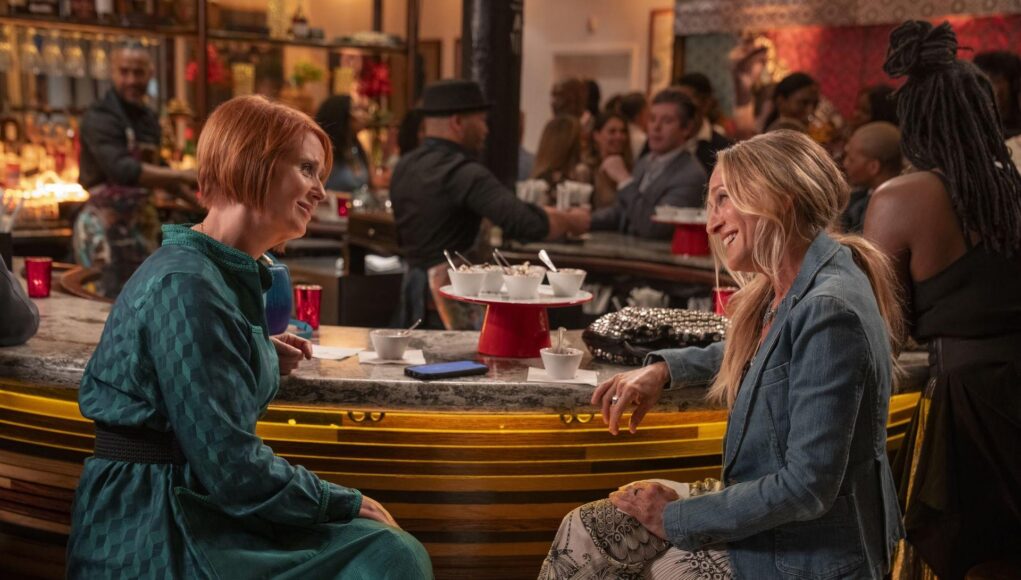Of all the sentences I’ve imbibed so far this year, a few have really stuck with me. One such was delivered by Jess Phillips, a Labour Party member of the UK Parliament, back in February: “Never, ever be grateful for the bare minimum.”
She was addressing a conference by gender equality charity The Fawcett Society, discussing the insurgent right and how feminism needs to be ambitious in its goals and not accept breadcrumbs of progress. I wrote it down in my notepad, but I didn’t even need to—it instantly resonated. And I’m sure I wasn’t the only one in the room for whom the words served as a reminder beyond their political life.
Her address swam back into my mind—quintessentially Cosmo pivot incoming—as I watched the new trailer for season three of everyone’s favorite high-budget hate watch: And Just Like That. The teaser is rich! Over-the-top! The series will undoubtedly make me full body cringe in parts but, on release, will certainly be my televisual brain rot of choice.
Within the trailer there’s a scene that is typical Sex And The City. Where the OG’s Carrie, Miranda, and Charlotte—representing the full cynic-to-mushy romantic spectrum—do what they do best: analyze a piece of relational communication.
This time, it’s a postcard from Aidan. It’s blank. Charlotte’s “aww” as Carrie reveals this news draws an arched eyebrow from Miranda. “Are we getting ‘aww’ over postcards, now?” Charlotte caveats that it wasn’t her most full-hearted “aww.” Carrie smiles and bows her head.
Should the spin-off series not be your trash culture of choice, Aidan is everyone’s favorite one-that-got-away in SATC. And, at the end of AJLT season two, he told Carrie that he could no longer split his time between New York and his farm in Virginia, where his three sons from a previous marriage live, after the youngest crashed a car while intoxicated (fair). This came after Carrie had just moved into a new plush apartment for them to share, because he found her old one too triggering (also, fans will know, entirely fair).
But what was interesting, to me at least, wasn’t really about him or where he’s at (we don’t, of course, have the full story). It was more Miranda’s sense-checking of Charlotte’s impulse to praise a piece of vague, low-effort communication. To essentially encourage her friend to do that one thing women are socialized to do, but are being increasingly warned can be catastrophic for everything from our careers and relationships to, as Phillips said, our civil rights: To be grateful for the bare minimum.
One convo with psychologist Dr. Sophie Mort, author of Unstuck, tells me I’m not the only one who’s had the phrase on their mind lately. Discussions about what to expect—and accept—are a mainstay in conversations with her clients, but also in chats with friends.
“It’s a really terrible sign,” she says, when crumbs of inconsistent or vague communication become normalized. “People can become so emotionally starved in these situations that even the tiniest morsel feels like such a gift, such a snack.”
But if you recognize yourself in the pattern—despite all the loud “know your worth!” advice on your feeds—she urges some self compassion.
“Being grateful for breadcrumbs isn’t a character flaw… There are lots of us who are susceptible to being overly grateful for the bare minimum, often because of the way that we’re kind of conditioned or trained by other people. This could be early in our life—by our caregivers or people in our family—and could be [by] people we’ve dated across our lifespan,” she tells Cosmopolitan.
“If we’ve had past relationships where even the basics were unreliable (if you’ve been with someone emotionally unavailable, inconsistent, critical), things like a blank postcard, a kind text, or them suddenly coming through and saying, You know, I’d love to spend the day with you, after blanking you for a really long time feel huge. That’s because of the discrepancy between how terrible you felt when they weren’t there for you, and how great you feel when it seems like they’re holding you in mind.”
But, while self compassion is important, if you recognize these behaviors in yourself, it’s important to try and get them in check—or, like Miranda, remind your friends that they need to. (This might feel hard, but trust me, no friends are valued quite like the ones who care enough to deliver tough love—plus, more and more women are getting frank with their friends about their dating lives.)
“When we get into this over-praising pattern of the bare minimum, we reinforce the other person’s behavior. They think: Actually I got a really big amount of praise and feedback for that small amount of effort so I don’t need to change my behavior,” she continues, adding that in the effort vacuum, some can end up giving more and more.
Sure, partnerships are rarely always equal in neat and easily-definable ways. And there’s nothing wrong with appreciating small gestures. (Postcards are also nice—ideally with words, though.)
But, the way Mort squares it, if you’re existing between small, infrequent, unsatisfying snippets of communication, these dynamics can wreak havoc on your ability to enjoy any sort of mental equilibrium. (Kind of a useful baseline as we all muddle through the chaos epoch that is the mid 2020s.)
“We can swing between an anxious state of being like, Where’s this person? Why are they not here for me?, to feeling relieved, and then resentment starts to flood in over time, as well as a kind of questioning of our self-worth and what we decide we deserve in relationships,” she says.
And this, she says, is a real point of concern. Every relationship is training you on what to accept. So even if you’re in a fuck it, dating for the plot stage and tolerating behavior you know really isn’t it, you are priming yourself to go through a similar scenario on your next spin of the romantic wheel.
“It can distort our sense of what’s healthy,” Mort warns. “If you get used to this, the contrast between these little scraps and the full meal of a healthy relationship can confuse us and our nervous system and make healthy intimacy and reliable, consistent, clear communication feel unfamiliar—and even suspicious.” She recalls a conversation with a friend who interpreted a potential partner expressing interest in such a healthy way that the regularity made her fear she was being love bombed.
“If you’re used to the bare minimum over and over for a long time, then when someone treats you actually well, you might be turned off. You might be panicked, you might feel flooded because it seems like something’s wrong when actually, finally, you’re being treated well, and this is what you should be expecting.”
So, there you have it. Listen to Dr. Mort. Listen to Miranda Hobbes. Listen to your most painfully honest friends. Listen to the partners (they are out there) who will encourage you to ask for, and expect, what you deserve. And, crucially, listen to yourself. If you’re accepting less, a small part of you will know.









